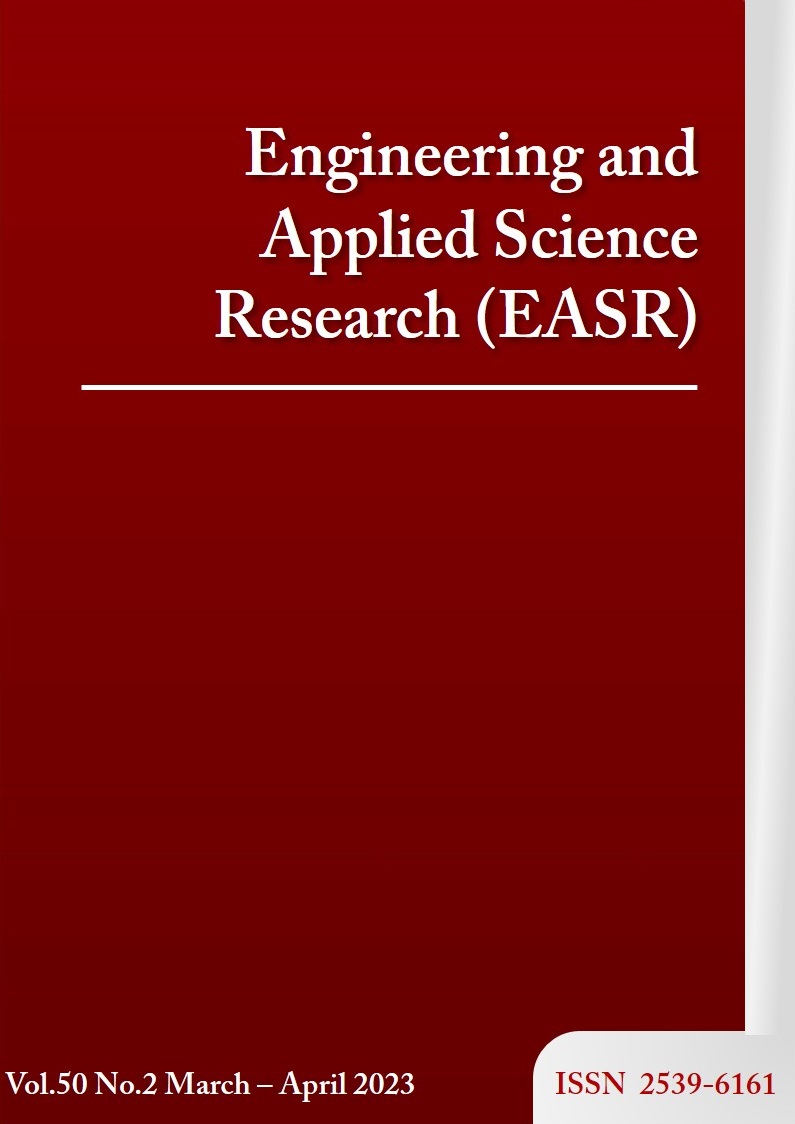Application of various machine learning models for fault detection in the refrigeration system of a brewing company
Main Article Content
Abstract
Industrial refrigeration systems typically exhibit a higher energy consumption rate compared to other systems. It is a very important system, and for the brewing industry, it is at the heart of brewing as, in each process, the temperature of the beer must be controlled. Therefore, a health monitoring or faults detection system is a necessary tool for predictive and preventive maintenance to avoid faults in the system. This work presents machine learning models for faults prediction of the refrigeration system in a brewing firm. The raw data of processing parameters are collected, while the system health for each data set is identified and used for machine learning model training. Three operation cases based on the actual operation of the brewery's refrigeration system are analyzed in this work. Several machine learning models including Naïve Bayes (NB), Generalized Linear Models (GLMs), Logistic Regression (LR), Fast Large Margin (FLM), Deep Learning (DL), Decision Tree (DT), Random Forest (RF), Gradient Boosted Trees (GBT), and Support Vector Machine (SVM) are applied for refrigeration system fault detection in the three operation cases while their performances are investigated. The numerical simulation is performed based on RapidMiner Studio. According to the experiment of the three operation cases, the deep learning model was found to be the most accurate and required the least amount of time for the analysis. The accuracy percentages are 86.7%, 90.2%, and 82.5%, while the running times are 15 seconds, 27 seconds, and 15 seconds, respectively. This work can be considered as the baseline for future studies on applied machine learning models for fault detection in refrigeration systems.
Article Details

This work is licensed under a Creative Commons Attribution-NonCommercial-NoDerivatives 4.0 International License.
This work is licensed under a Creative Commons Attribution-NonCommercial-NoDerivatives 4.0 International License.
References
Jabbar MA. Breast cancer data classification using ensemble machine learning. Eng Appl Sci Res. 2021;48(1):65-72.
Vorapatratorn S, Suchato A, Punyabukkana P. Fast obstacle detection system for the blind using depth image and machine learning. Eng Appl Sci Res. 2021;48(5):593-603.
Ighravwe DE, Mashao D. Using a neural network model to determine electricity sales under renewable energy systems penetration consideration. Eng Appl Sci Res. 2021;48(1):73-82.
Noyunsan C, Katanyukul T, Saikaew K. Performance evaluation of supervised learning algorithms with various training data sizes and missing attributes. Eng Appl Sci Res. 2018;45(3):221-9.
Prabha C, Arunkumar SP, Prabu K. Prediction of effect of refrigeration system parameters on the performance of a vapour compression refrigeration system using design of experiments. Int J Mech Prod Eng Res Dev. 2018;8(4):567-74.
Behnam P, Faegh M, Shafii MB, Khiadani M. A comparative study of various machine learning methods for performance prediction of an evaporative condenser. Int J Refrig. 2021;126:280-90.
Gupta AK, Kashyap S, Sarkar J. Machine learning model of regenerative evaporative cooler for performance prediction based on experimental investigation. Int J Refrig. 2022;137:178-87.
Soltani Z, Sørensen KK, Leth J, Bendtsen JD. Fault detection and diagnosis in refrigeration systems using machine learning algorithms. Int J Refrig. 2022;144:34-45.
Barathula S, Chaitanya S, Srinivasan K. Evaluation of machine learning models in the classification of pool boiling regimes up to critical heat flux based on boiling acoustics. Int J Heat Mass Transf. 2023;201:123623.
Qaqish BF, Preisser JS. Generalized linear models for independent and dependent responses. In: Sen PK, Rao CR, editors. Handbook of Statistics Volume 18. Amsterdam: Elsevier; 2000. p. 193-222.
Ambrish G, Ganesh B, Ganesh A, Srinivas C, Dhanraj, Mensinkal K. Logistic regression technique for prediction of cardiovascular disease. Glob Transit Proc. 2022;3(1):127-30.
Nayak SK, Pradhan BK, Banerjee I, Pal K. Analysis of heart rate variability to understand the effect of cannabis consumption on Indian male paddy-field workers. Biomed Signal Process Control. 2020;62:102072.
Bansal M, Goyal A, Choudhary A. A comparative analysis of K-Nearest neighbor, genetic, support vector machine, decision tree, and long short term memory algorithms in machine learning. Decis Anal J. 2022;3:100071.
Robles-Velasco A, Cortés P, Muñuzuri J, De Baets B. Prediction of pipe failures in water supply networks for longer time periods through multi-label classification. Expert Syst Appl. 2023;213:119050.
Hu A, Liao H, Guan W, Dong J, Qian X. Support vector machine model based on OTSU segmentation algorithm in diagnosing bronchiectasis with chronic airway infections. J Radiat Res Appl Sci. 2023;16:100500.
Li Z, Shi S, Chen H, Wei W, Wang Y, Liu Q, et al. Machine learning based diagnosis strategy for refrigerant charge amount malfunction of variable refrigerant flow system. Int J Refrig. 2020;110:95-105.



